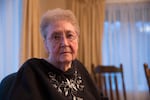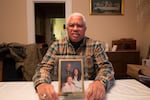
Alan Batts holds a family photo of him with his sister, Karen, and his mother, Elizabeth. Karen Batts died homeless on Portland's streets Jan. 7, 2017, during a winter storm.
Amelia Templeton / OPB
A woman who died of hypothermia in a downtown Portland parking garage Saturday struggled for much of her life with schizophrenia. And she had been recently evicted from an affordable housing complex.
Karen Batts spent most of her childhood in Portland, and attended Grant High School. As an adult, she would at times become isolated because of her schizophrenia.
Her family said over the last year, Batts had stopped answering their phone calls.
"I'm so sad. It's just, a parent isn't supposed to lose a child," Elizabeth Batts said of her daughter on Monday.
Related: ODOT Clears Homeless Camp In Portland During Freezing Temperatures
Batts said she didn’t learn until too late that her daughter Karen had been evicted in October and was living on the streets.
“Nobody reached out to us," Elizabeth Batts told OPB. "Nobody cared about us to tell us what was going on. I mean, why couldn’t somebody tell us something."
Batts said had she known her daughter was facing eviction, she would have paid her rent, as she has in the past.
Karen Batt's brother, Alan Batts, was exactly one year older than her. The siblings shared a birthday, and a close childhood.
"We were kindred spirits," he says. "I used to walk her to school, when we first moved here. We were army brats."
As an adult, Alan Batts tried to watch over his sister. Last year, after she stopped returning the family's calls, he tried to visit her at her apartment, but she wouldn't buzz him in. So Batts asked the Portland Police to conduct a welfare check.
"They knocked on her door, and said she wasn’t a danger to herself or others, and so they couldn’t put her in a hospital. That’s what I requested, that she be admitted into the hospital," he said.
Batts says his sister had been hospitalized once previously, and that the hospital stay helped stabilize her.
Once she was evicted, he said, it became impossible to find her. Batts says her illness made her fearful of others, and she said she'd been bullied at homeless shelters in the past.

Tents gather snow during a winter storm on Saturday, Jan. 7, 2017. Of five occupants interviewed, none knew the location of warming shelters, and only one expressed interest in going.
John Rosman / OPB
"People were out there trying to find people, to get them to shelters, and she was doing everything she could to stay away from them," he said.
Northwest Housing Alternatives manages the Oak Street Apartments where Karen Batts lived. The apartments are dedicated to seniors and people living with disabilities, including mental illness.
Related: Portland Police: Woman Believed To Have Died Of Exposure During Storm
The organization said Batts had been a model resident for seven years. But her behavior changed last spring. She was involved in a series of disturbances that impacted other residents. At the time of her eviction, she was two months behind on her rent.
“Our staff reached out to her repeatedly, had Project Respond come reach out to her, had adult protective services come and reach out to her," said Martha McLennan, executive director for Northwest Housing Alternatives.
She said mental health workers evaluated Batts several times to see if she qualified for a mental health hold, but she did not meet the stringent criteria.
“I see situations not uncommonly, where the person who needs the help doesn’t know how to ask, or can’t ask, or is in no shape to have that realization and ask,” McLennan said.
She added that privacy laws often prevent the nonprofit from notifying family members when their tenets are facing eviction.
Batts is one of three people living on the street who have died of exposure so far in 2017. David Guyot, 68, and Mark Johnson, 51, also died of hypothermia this winter while living on Portland's streets, according to the Multnomah County Medical Examiner's Office.





